- Home
- Oliver Sacks
Musicophilia Page 2
Musicophilia Read online
Page 2
* * *
I HAVE NEVER MET another person with a story like Tony Cicoria’s, but I have occasionally had patients with a similar sudden onset of musical or artistic interests— including Salimah M., a research chemist. In her early forties, Salimah started to have brief periods, lasting a minute or less, in which she would get “a strange feeling”— sometimes a sense that she was on a beach that she had once known, while at the same time being perfectly conscious of her current surroundings and able to continue a conversation, or drive a car, or do whatever she had been doing. Occasionally these episodes were accompanied by a “sour taste” in the mouth. She noticed these strange occurrences, but did not think of them as having any neurological significance. It was only when she had a grand mal seizure in the summer of 2003 that she went to a neurologist and was given brain scans, which revealed a large tumor in her right temporal lobe. This had been the cause of her strange episodes, which were now realized to be temporal lobe seizures. The tumor, her doctors felt, was malignant (though it was probably an oligodendroglioma, of relatively low malignancy) and needed to be removed. Salimah wondered if she had been given a death sentence and was fearful of the operation and its possible consequences; she and her husband had been told that there might be some “personality changes” following it. But in the event, the surgery went well, most of the tumor was removed, and after a period of convalescence, Salimah was able to return to her work as a chemist.
She had been a fairly reserved woman before the surgery, who would occasionally be annoyed or preoccupied by small things like dust or untidiness; her husband said she was sometimes “obsessive” about jobs that needed to be done around the house. But now, after the surgery, Salimah seemed unperturbed by such domestic matters. She had become, in the idiosyncratic words of her husband (English was not their first language), “a happy cat.” She was, he declared, “a joyologist.”
Salimah’s new cheerfulness was apparent at work. She had worked in the same laboratory for fifteen years and had always been admired for her intelligence and dedication. But now, while losing none of this professional competence, she seemed a much warmer person, keenly sympathetic and interested in the lives and feelings of her co-workers. Where before, in a colleague’s words, she had been “much more into herself,” she now became the confidante and social center of the entire lab.
At home, too, she shed some of her Marie Curie–like, work-oriented personality. She permitted herself time off from her thinking, her equations, and became more interested in going to movies or parties, living it up a bit. And a new love, a new passion, entered her life. She had been “vaguely musical,” in her own words, as a girl, had played the piano a little, but music had never played any great part in her life. Now it was different. She longed to hear music, to go to concerts, to listen to classical music on the radio or on CDs. She could be moved to rapture or tears by music which had carried “no special feeling” for her before. She became “addicted” to her car radio, which she would listen to while driving to work. A colleague who happened to pass her on the road to the lab said that the music on her radio was “incredibly loud”— he could hear it a quarter of a mile away. Salimah, in her convertible, was “entertaining the whole freeway.”
Like Tony Cicoria, Salimah showed a drastic transformation from being only vaguely interested in music to being passionately excited by music and in continual need of it. And with both of them, there were other, more general changes, too— a surge of emotionality, as if emotions of every sort were being stimulated or released. In Salimah’s words, “What happened after the surgery— I felt reborn. That changed my outlook on life and made me appreciate every minute of it.”
* * *
COULD SOMEONE DEVELOP a “pure” musicophilia, without any accompanying changes in personality or behavior? In 2006 just such a situation was described by Rohrer, Smith, and Warren, in their striking case history of a woman in her mid-sixties who had intractable temporal lobe seizures with a right temporal lobe focus. After seven years of seizure activity, her seizures were finally brought under control by the anticonvulsant drug lamotrigine (LTG). Prior to starting on this medication, Rohrer and his colleagues wrote, this lady
had always been indifferent to music, never listening to music for pleasure or attending concerts. This was in contrast to her husband and daughter, who played the piano and violin…. She was unmoved by the traditional Thai music she had heard at family and public events in Bangkok and by classical and popular genres of Western music after she moved to the United Kingdom. Indeed, she continued to avoid music where possible, and actively disliked certain musical timbres (for example, she would shut the door to avoid hearing her husband playing piano music, and found choral singing “irritating”).
This indifference to music changed abruptly when the patient was put on lamotrigine:
Within several weeks of starting LTG, a profound change was noted in her appreciation of music. She sought out musical programmes on the radio and television, listened to classical music stations on the radio for many hours each day, and demanded to attend concerts. Her husband described how she had sat “transfixed” throughout La Traviata and became annoyed when other audience members talked during the performance. She now described listening to classical music as an extremely pleasant and emotion-charged experience. She did not sing or whistle, and no other changes were found in her behavior or personality. No evidence of thought disorder, hallucinations, or disturbed mood was seen.
While Rohrer et al. could not pinpoint the precise basis of their patient’s musicophilia, they hazarded the suggestion that, during her years of incorrigible seizure activity, she might have developed an intensified functional connection between perceptual systems in the temporal lobes and parts of the limbic system involved in emotional response— a connection that only became apparent when her seizures were brought under control with medication. In the 1970s, David Bear suggested that such a sensory-limbic hyperconnection might be the basis for the emergence of the unexpected artistic, sexual, mystical, or religious feelings that sometimes occur in people with temporal lobe epilepsy. Could something similar have occurred with Tony Cicoria, too?
LAST SPRING, Cicoria took part in a ten-day music retreat for student musicians, gifted amateurs, and young professionals. The camp doubles as a showroom for Erica vanderLinde Feidner, a concert pianist who also specializes in finding the perfect piano for each of her clients. Tony had just bought one of her pianos, a Bösendorfer grand, a unique prototype made in Vienna— she thought he had a remarkable instinct for picking out a piano with exactly the tone he wanted. It was, Cicoria felt, a good time, a good place, to make his debut as a musician.
He prepared two pieces for his concert: his first love, Chopin’s B-flat Minor Scherzo; and his own first composition, which he called Rhapsody, Opus 1. His playing, and his story, electrified everyone at the retreat (many expressed the fantasy that they, too, might be struck by lightning). He played, said Erica, with “great passion, great brio”— and if not with supernatural genius, at least with creditable skill, an astounding feat for someone with virtually no musical background who had taught himself to play at forty-two.
* * *
WHAT DID I THINK, in the end, of his story, Dr. Cicoria asked me. Had I ever encountered anything similar? I asked him what he thought, and how he would interpret what had happened to him. He replied that as a medical man he was at a loss to explain these events, and he had to think of them in “spiritual” terms now. I countered that, with no disrespect to the spiritual, I felt that even the most exalted states of mind, the most astounding transformations, must have some physical basis or at least some physiological correlate in neural activity.
At the time of his lightning strike, Dr. Cicoria had both a near-death experience and an out-of-body experience. Many supernatural or mystical explanations have arisen to explain out-of-body experiences, but they have also been a topic of neurological investigation for a century or more. Such exp
eriences seem to be relatively stereotyped in format: one seems to be no longer in one’s own body but outside it, and, most commonly, looking down on oneself from eight or nine feet above (neurologists refer to this as “autoscopy”). One seems to see clearly the room or space around one and other people and objects nearby, but with an aerial perspective. People who have had such experiences often describe vestibular sensations like “floating” or “flying” in the air. Out-of-body experiences can inspire fear or joy or a feeling of detachment, but they are usually described as intensely “real”— not at all like a dream or hallucination. They have been reported in many sorts of near-death experiences, as well as in temporal lobe seizures. There is some evidence that both the visuospatial and vestibular aspects of out-of-body experiences are related to disturbed function in the cerebral cortex, especially at the junctional region between the temporal and parietal lobes.1
But it was not just an out-of-body experience that Dr. Cicoria reported. He saw a bluish-white light, he saw his children, his life flashed past him, he had a sense of ecstasy, and, above all, he had a sense of something transcendental and enormously significant. What could be the neural basis of this? Similar near-death experiences have often been described by people who have been, or believed themselves to be, in great danger, whether they are involved in sudden accidents, struck by lightning, or, most commonly, revived after a cardiac arrest. All of these are situations not only fraught with terror but likely to cause a sudden drop in blood pressure and cerebral blood flow (and, if there is cardiac arrest, a deprivation of oxygen to the brain). There is likely to be intense emotional arousal and a surge of noradrena-line and other neurotransmitters in such states, whether the affect is one of terror or rapture. We have, as yet, little idea of the actual neural correlates of such experiences, but the alterations of consciousness and emotion that occur are very profound and must involve the emotional parts of the brain— the amygdala and brainstem nuclei— as well as the cortex.2
While out-of-body experiences have the character of a perceptual illusion (albeit a complex and singular one), near-death experiences have all the hallmarks of mystical experience, as William James defines them— passivity, ineffability, transience, and a noetic quality. One is totally consumed by a near-death experience, swept up, almost literally, in a blaze (sometimes a tunnel or funnel) of light, and drawn towards a Beyond— beyond life, beyond space and time. There is a sense of a last look, a (greatly accelerated) farewell to things earthly, the places and people and events of one’s life, and a sense of ecstasy or joy as one soars towards one’s destination— an archetypal symbolism of death and transfiguration. Experiences like this are not easily dismissed by those who have been through them, and they may sometimes lead to a conversion or metanoia, a change of mind, that alters the direction and orientation of a life. One cannot suppose, any more than one can with out-of-body experiences, that such events are pure fancy; very similar features are emphasized in every account. Near-death experiences must also have a neurological basis of their own, one which profoundly alters consciousness itself.
What about Dr. Cicoria’s remarkable access of musicality, his sudden musicophilia? Patients with degeneration of the front parts of the brain, so-called frontotemporal dementia, sometimes develop a startling emergence or release of musical talents and passions as they lose the powers of abstraction and language— but clearly this was not the case with Dr. Cicoria, who was articulate and highly competent in every way. In 1984, Daniel Jacome described a patient who had had a stroke damaging the left hemisphere of his brain and consequently developed “hypermusia” and “musicophilia,” along with aphasia and other problems. But there was nothing to suggest that Tony Cicoria had had a stroke or experienced any significant brain damage, other than a very transient disturbance to his memory systems for a week or two after the lightning strike.
His situation did remind me a bit of Franco Magnani, the “memory artist” of whom I have written.3 Franco had never thought of being a painter until he experienced a strange crisis or illness— perhaps a form of temporal lobe epilepsy— when he was thirty-one. He had nightly dreams of Pontito, the little Tuscan village where he was born; after he woke, these images remained intensely vivid, with a full depth and reality (“like holograms”). Franco was consumed by a need to make these images real, to paint them, and so he taught himself to paint, devoting every free minute to producing hundreds of views of Pontito.
Could Dr. Cicoria’s lightning strike have set off epileptic tendencies in his temporal lobes? There are many accounts of the onset of musical or artistic inclinations with temporal lobe seizures, and people with such seizures may also develop strong mystical or religious feelings, as he had. But then, Cicoria had not described anything resembling seizures, and had apparently had a normal EEG following the event.
And why was there such a delay in the development of Cicoria’s musicophilia? What was happening in the six or seven weeks that elapsed between his cardiac arrest and the rather sudden eruption of musicality? We know that there were immediate after-effects of the lightning strike: his out-of-body experience, his near-death experience, the confusional state that ensued for a few hours, and the disturbance of memory that lasted a couple of weeks. These could have been due to cerebral anoxia alone— for his brain must have been without adequate oxygen for a minute or more— though there could also have been direct cerebral effects from the lightning itself. One has to suspect, however, that Dr. Cicoria’s apparent recovery a couple of weeks after these events was not as complete as it seemed, that there were other, unnoticed forms of brain damage, and that his brain was still reacting to the original insult and reorganizing itself during this time.
Dr. Cicoria feels that he is “a different person” now— musically, emotionally, psychologically, and spiritually. This was my impression, too, as I listened to his story and saw something of the new passions which had transformed him. Looking at him from a neurological vantage point, I felt that his brain must be very different now from what it was before his lightning strike or in the days immediately following this, when neurological tests showed nothing grossly amiss. Changes were presumably occurring in the weeks afterwards, when his brain was reorganizing— preparing, as it were, for musicophilia. Could we now, a dozen years later, define these changes, define the neurological basis of his musicophilia? Many new and far subtler tests of brain function have been developed since Cicoria had his injury in 1994, and he agreed that it would be interesting to investigate this further. But after a moment, he reconsidered, and said that perhaps it was best to let things be. His was a lucky strike, and the music, however it had come, was a blessing, a grace— not to be questioned.
2
A Strangely Familiar Feeling: Musical Seizures
Jon S., a robust man of forty-five, had been in perfect health until January of 2006. His working week had just started; he was in the office on a Monday morning, and went to get something from the closet. Once he entered the closet, he suddenly heard music— “classical, melodic, quite nice, soothing…vaguely familiar…. It was a string instrument, a solo violin.”
He immediately thought, “Where the hell is that music coming from?” There was an old, discarded electronic device in the closet, but this, though it had knobs, had no speakers. Confusedly, in a state of what he later called “suspended animation,” he groped for the controls of the device to turn the music off. “Then,” he says, “I went out.” A colleague in the office who saw all this described Mr. S. as “slumped over, unresponsive,” in the closet, though not convulsing.
Mr. S.’s next memory was of an emergency medical technician leaning over him, questioning him. He could not remember the date, but he remembered his name. He was taken to the emergency room of a local hospital, where he had another episode. “I was lying down, the doctor was checking me over, my wife was there…then I started to hear music again, and I said, ’It’s happening again,’ and then, very quickly, I was out of it.”
&nbs
p; He woke up in another room, where he realized he had bitten his tongue and cheeks and had intense pain in his legs. “They told me I had had a seizure— the full thing, with convulsions…. It all occurred much quicker than the first time.”
Mr. S. had some tests and was put on an antiepileptic drug to protect him against further seizures. Since then, he has had more tests (none of which showed anything amiss— a situation not uncommon with temporal lobe epilepsy). Though no demonstrable lesion showed up on brain imaging, he mentioned that he had suffered a fairly severe head injury at the age of fifteen— a concussion, at least— and this may have produced slight scarring in the temporal lobes.
When I asked him to describe the music he heard just before his seizures, he tried to sing it but could not— he said he could not sing any music, even if he knew it well. He said he was not too musical, in any case, and that the sort of classical violin music he had “heard” before his seizure was not at all to his taste; it sounded “whiny, catlike.” Usually he listens to pop music. Yet it seemed familiar somehow— perhaps he had heard it long ago, as a child?
I told him that if he ever did hear this music— on the radio, perhaps— he should note what it was and let me know. Mr. S. said that he would keep his ears open, but as we talked about it, he could not help wondering whether there was just a feeling, perhaps an illusion, of familiarity attached to the music, rather than an actual recollection of something he had once heard. There was something evocative about it, but elusive, like the music heard in dreams.

 Uncle Tungsten
Uncle Tungsten Oaxaca Journal
Oaxaca Journal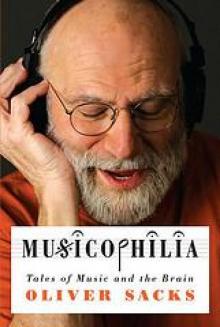 Musicophilia
Musicophilia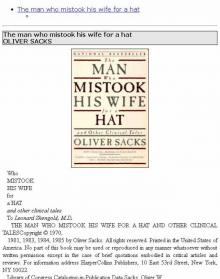 The man who mistook his wife for a hat
The man who mistook his wife for a hat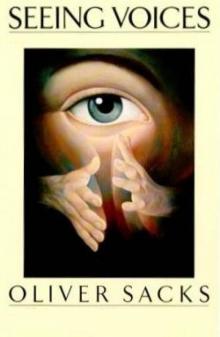 1989 - Seeing Voices
1989 - Seeing Voices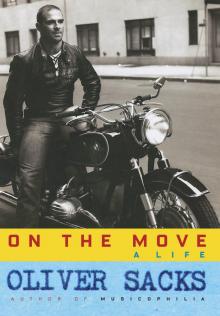 On the Move: A Life
On the Move: A Life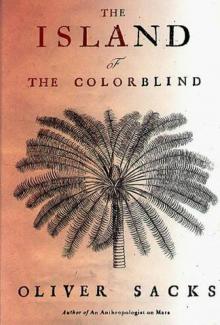 1996 - The Island of the Colorblind
1996 - The Island of the Colorblind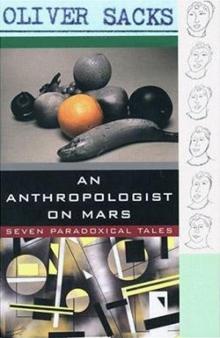 An Anthropologist on Mars: Seven Paradoxical Tales
An Anthropologist on Mars: Seven Paradoxical Tales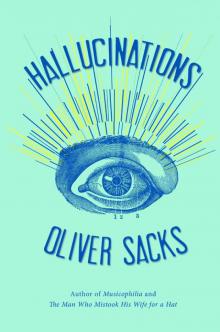 Hallucinations
Hallucinations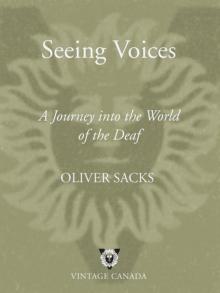 Seeing Voices
Seeing Voices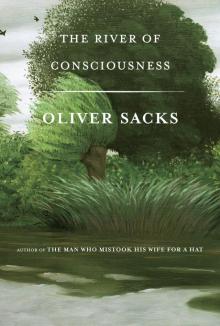 The River of Consciousness
The River of Consciousness Vintage Sacks
Vintage Sacks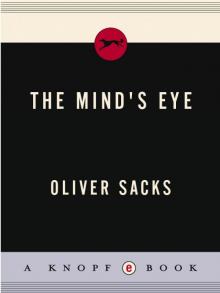 The Mind's Eye
The Mind's Eye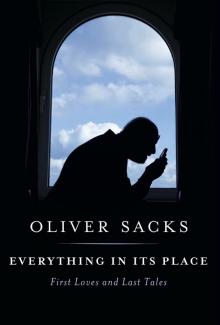 Everything in Its Place
Everything in Its Place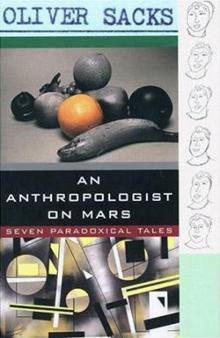 An Anthropologist on Mars (1995)
An Anthropologist on Mars (1995) Uncle Tungsten: Memories of a Chemical Boyhood (2001)
Uncle Tungsten: Memories of a Chemical Boyhood (2001)